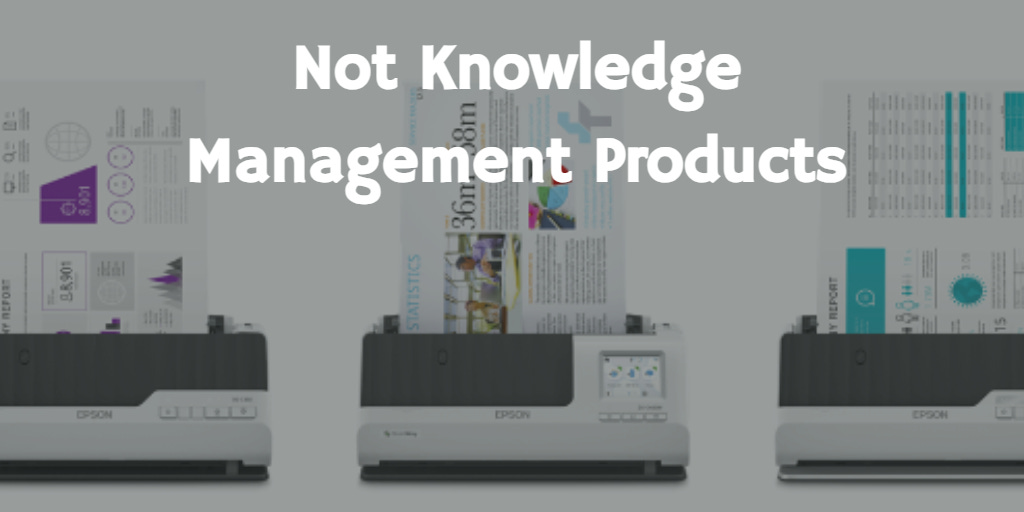Buzzwords Suck and Confuse Customers
Who doesn't love wading through buzzwords when trying to understand a product? I share a few examples from my ECM editor days.
Buzzwords and jargon confuse more than clarify.
I like words. A lot. Probably more than the next guy. But I like my words to add clarity, not confusion.
That's one of the reasons why I HATE buzzwords (and jargon) in content marketing.
Of course, just because it’s a buzzword doesn’t mean it’s BS.
Generative AI (and AI in general) is the buzziest of words (though the heat has died down slightly lately). It’s not a buzzword for the sake of drawing attention, you can use genAI in business now. But we have seen consultants and software vendors slap “AI” broadly onto their services.
New things happen all the time. Sometimes we need a word or phrase to describe this new concept. That’s fine.
Take content/inbound marketing; not entirely a buzzword, but a decade ago folks were using inbound to describe pretty much any marketing service. Fifteen years after my first exposure to the concept, I’m still not a fan of the phrase (I prefer content marketing as folks can get confused by “inbound” and think it’s all pull and no push – but that’s a post for another day).
Despite Google doing everything it can to screw most of us over (this is a great read about Google’s user-focused update from last year), content marketing remains a worthwhile effort. It’s not a new concept, but it was introduced at a time when the marketing world (and the rest of us) needed a break from constant email spamming.

Buzzword Hate Example #1 – Knowledge Management
What I hate is when brain-dead folks attach their lips to the teat of the buzzword and start a-sucking as they try to add life to a failing business or product line (or goose a successful one). Especially when they don't quite "get" the new concept. And even MORE especially when what they sell/offer is only tangentially related – if at all – to this great, new, life/business-altering stupendous THING.
The same goes for excessive industry jargon. While a certain degree of specialized language is inevitable, marketers often go overboard, peppering their materials with opaque terms that alienate potential customers rather than invite them in. It's an arrogant attitude that assumes the audience is already fully versed in all the insider lingo.
One example, in the late 90s, knowledge management was a thing in the IT space. As a discipline, KM has deep roots and is a fascinating field of study focused on managing change and culture and how organizations can harness what people know.
In the ECM space, collaboration and some of the DM companies locked onto the concept and began touting themselves as KM platforms. Slack could've been branded that way had they existed back then. Anyway, more than most concepts, there's never going to be such a thing as a KM product. Any KM plan is going to first be a strategy reinforced by culture and supported by technology.
Anyway, I knew that "knowledge management" as a buzzword had jumped the shark when I saw an ad in inform (the magazine I edited at the time) from a scanner manufacturer. Yep, the marketing folks at Bell & Howell thought that advertising their scanner as the start of a KM solution was a good idea.
A scanner. KM.
I saw the link – digitize paper so that it can then be found and shared. Still. I thought at the time and still do – just, no.
Buzzword Hate Example #2: “Automation” & Its Discontents
Beyond the confusion, there’s a deeper reason I hate buzzwords. They are used by unscrupulous (or simply wrong) people to create confusion and sell services. If you've been in business for any length of time and have happy customers, that's a good thing.
Why companies think they have to glom onto the next new thing all the time WHEN THEY DON'T DO THAT THING eludes me.
I wrote this in 2002 after that year's AIIM Show and Conference (I was AIIM’s magazine editor at the time:
“The most important next step, in my opinion, is to stop confusing users with buzzwords. Hyland, a solid company with good products, has a "Web content management" product that really isn't. Other companies do the same thing. Xerox Global Services document management product isn't really what we think of as document management. So, muzzle the marketing folks, describe what your product does in plain English, and let's start making those billion-dollar market projections come true. Here's to no new buzzwords in 2003.”
Yeah, that wish came true.
I was in for seven more years of crappy pitches and constant rejiggering of products to match what was "current." I even asked the marketing guy at the time for Hyland "is it really a WCM product" and HE SAID NO!
I mean, what?
Two years ago, I gave a webinar presentation to the AIIM Florida chapter about the upcoming AIIM Conference. Twenty years later, the phrases (and publications I was editing) had changed – digital transformation and intelligent automation were (and are) riding high – but the torture of the English language in vendor marketing had not.
I was Editor-in-Chief of The Document Imaging Report at the time and turned that presentation into an article. The following — through to the next heading — is an excerpt of the horror of buzzwords in the intelligent document processing (IDP) corner of the IT market.
As I said earlier, none of this is really new. Business of all kinds have been attempting to automate work probably for as long as there’s been work – after all, what’s the wheel but automation for your feet? It’s the industry word salad that we’re constantly dealing with which threatens to bury us under a deluge of verbiage.
I dislike “digital transformation.” “Hyperautomation” is even worse. They don’t really mean anything. It varies depending on what you’re trying to address – getting rid of paper is digital transformation. Using RPA to connect manual processes is digital transformation. To tie us to the photo of the Model T and manufacturing roots of the word “automation;” Industry 4.0 in manufacturing is all about digital transformation.
What do I mean by word salad?
Here’s a call out from a website of a company in this space:
Hyperautomation with Intelligent Document Processing, Business Process Management, Robotic Process Automation, Automated Governance, and Integration.
What does that even mean? I have no idea
After reading that quote, I jotted down all of the phrases for the process/capture industry. I may have missed a few. Intelligent capture. Intelligent document capture. Intelligent automation. Hyperautomation. Digital transformation. Capture 2.0. Process automation. Intelligent process automation. Intelligent document automation. Digital process automation.
I have been on many vendor – process guys, capture guys, ECM guys – and other websites where combinations of these phrases are used in the same paragraph. I’ve been in the industry or adjacent to it for my entire career and I have a hard time sorting out the language sometimes.
For the vendors out there, what’s that confusion doing to your customers?
My Time in the Copier Industry
I spent four years as the content guy (officially VP, but that feels pretentious since there were only 5 of us) creating and implementing content strategy for copier dealers.
I did my best not to play buzzword bingo for our clients.
It was hard.
Some of the material I read that potential clients used . . . e-gads. There were times I would read pages about a product or service offering and have no idea what they're selling – and I know what they're selling! The pages were larded with business speak, dollar words, and sprinkled with any buzzword that was even slightly related to the product.
I constantly got push back for using simple language. That's a rant for another day. But, no, you don't sound smarter or more professional when you use big words. Almost always, you just sound like a marketing asshat who swallowed a book on bad business writing — and a thesaurus.
Jargon Isn’t Always Bad
A quick note: there is a difference between industry jargon and buzzwords. Within a group, jargon is useful linguistic shorthand and can act as a sort of bonding tool, helping to solidify a sense of community and in-group membership.
It's when marketers try to wield that insider jargon as a way to dazzle and confuse outsiders that it becomes a problem.
What’s the Takeaway? Look at the Words You Use
Run away from buzzwords.
Take a quick look at your website.
Is it full of jargon? Buzzwords that don’t mean much of anything.
Is the focus on you rather than on your customers?
Kill the jargon.
Focus on showing your customers how you’ll make their lives better.
And please, for the love of all that is good and holy, the next time a new concept comes your way THINK about how appropriate it is for you and what you do before you try to figure out how you can slap it on to your current line-up of services and say "Yep, we do this great new thing" when you don't.
Let’s kill your buzzwords and jargon together. Drop me a note here, duhonius@gmail.com, and/or 301-275-7496.
I look forward to working with you.




